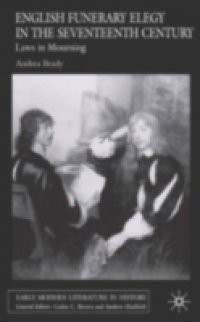The funerary elegy was one of the most common and distinguished poetic genres of the early modern period. Governed by convention, elegies also provided an occasion for poets - from famous laureates to private individuals - to negotiate with the laws of mourning, religious and social expectation, and political constraints. This book situates elegy's conventions with the rituals of rhetoric and mourning. Drawing on anthropology to analyze transitional rites, charisma, and the performance of grief, it offers new readings of famous poems, as well as little-known texts published in manuscript and popular print. It recontextualizes elegies commemorating heraldic funerals and public executions, to reveal how poets asserted their independence and unique status by manipulating the rituals designed to affirm consensus and the power of the state. Examining three famous executions of the 1640s, critical elegies for other poets, and poems mourning the death of children, Brady reveals the radical potentiality of the elegiac genre. This book provides new context for canonical elegies by Ben Jonson, John Donne, Henry King and John Milton among others, and introduces a provocative set of questions about the relationship between private experience and public morality, the body and creativity, and death and writing.

